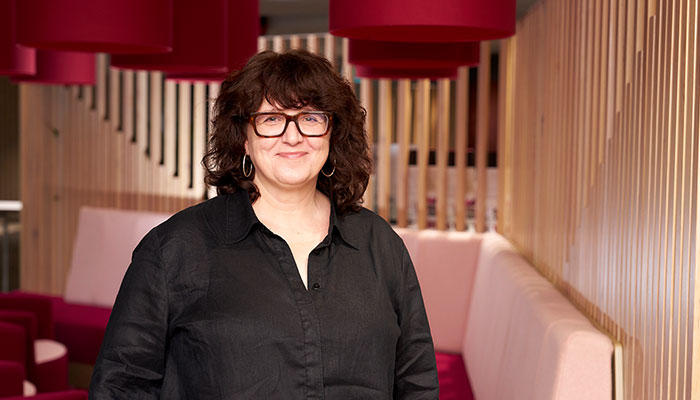Teacher: Dr Alison Pullen, pictured, is a Professor of Gender, Work and Organization at Macquarie Business School and has just celebrated 10 years of teaching at Macquarie.

Groundwork: Alison holds a Masters Degree in Organisation Development and a PhD in Management.
Gold stars: In 2023 Alison received the British Academy of Management Research medal.
How Alison’s students describe her: Alison is passionate and caring, and always has her students best interests at heart. She doesn’t shy away from the ‘hard stuff’ and is always there for them, whatever they need.
What Alison says:
I approach the classroom as a space to build relationships. I demonstrate to students that if you can develop non-hierarchical relationships between people you can achieve so much more. A lot of learning comes from being in a safe, inclusive environment where people learn from each other because they are able to be open with their own experiences. Some students go on a learning journey where they realise that they've not been the managers they thought they were, and going through that process and sharing with colleagues in the classroom, they reach a point where they're prepared to develop new sets of skills.
Unlearning traditional ways of working is key to shifting mindsets. It’s about building safe spaces where people can develop different approaches to the ways in which they view their colleagues or their environments. And I do that in order to stress the importance of inclusive and ethical ways of working, and the ways in which inclusive and ethical relationships really matter to all of our jobs, wherever we work.
We make our conceptual work within the Business School very practical. We give students live workplace cases where they can see concepts and ideas in practice and see what works in these environments and what doesn't. Over a 10-week course or a five-day block module, they can apply the course materials to what's happening in these workplaces. We talk about what's happening in these particular contexts and they usually give very good recommendations.
What I love most about teaching is seeing students become comfortable with other people within a classroom. In all the classes that I've ever taught, there are people who are very verbal and dominant in the classroom, and there are others who are not. And then there are others in between. But what I love the most is when we all become equal and they forget that I am the teacher. By destabilising the power difference between teacher and student, we can produce knowledge differently and encourage new experiences.
I love to see people push themselves to levels they never thought they could get to. I always encourage students not just to pass the course, but to excel in the class - and the results show that. Instead of thinking about it as individual learning, I ask the students to think about how they can learn from each other, and to help each other excel in the course. This way we have informal mentoring happening in the classroom.
We try to get students to see that businesses can be used to bring about good. In our MBA Managing People class my colleague Grant Michelson and myself have developed an ethical approach to understanding the relationship between people and organisations. If we are unable to make a difference to society at large, we can always make a difference to people's lives. And if many of us are making these micro interventions, then over time they have more impact because all these interventions add up to create a ripple effect. For example, if we are kind or caring to one person, if we can make a difference to one person over time and throughout generations, then we can relate to one another more humanely and this would change the ways in which people manage others at work.
Some of the best classes we've had on the MBA program are when we talk about issues that students might initially shy away from. But there comes a time in the course where they say, ‘do you mind if we talk about this?’ And that's usually around racism or other forms of discrimination because they want this knowledge to be able to take back to work. It is important in the current climate we're in that students are equipped with the skills to be able to deal with inequality, discrimination and injustice.
One piece of advice I always give students is to follow what you know is right. Being a student is challenging but if we follow what we know is right for us and we try and listen to those who might know more than us in specific cultural context, then we won't go far wrong. And try to be there for each other.
Dr Alison Pullen is a Professor of Gender, Work and Organisation at Macquarie Business School.



